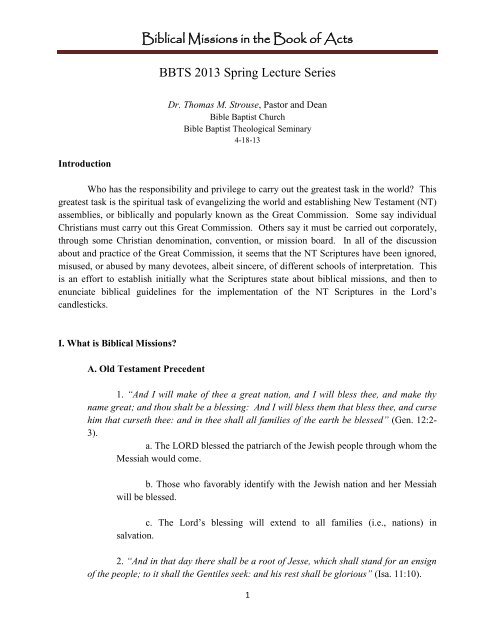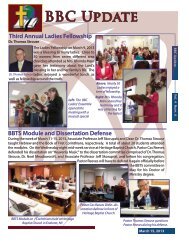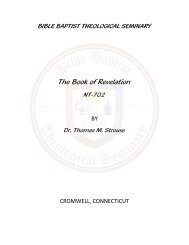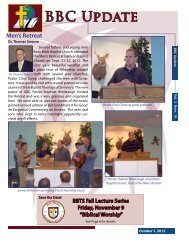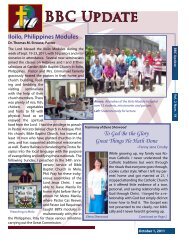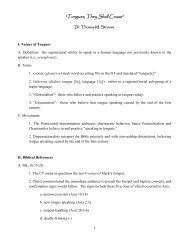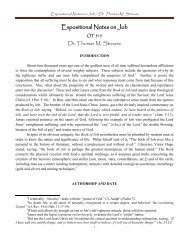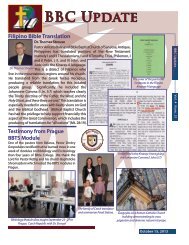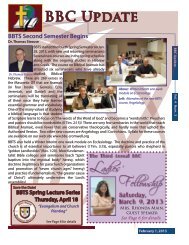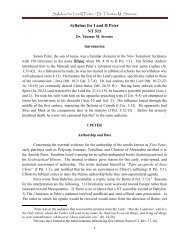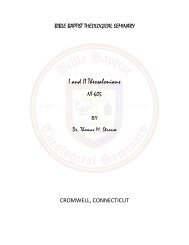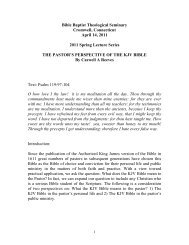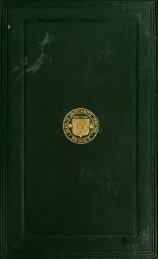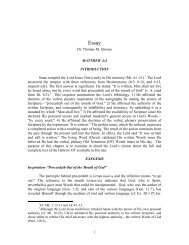Biblical Missions in the Book of Acts Lecture ... - Bbc-cromwell.org
Biblical Missions in the Book of Acts Lecture ... - Bbc-cromwell.org
Biblical Missions in the Book of Acts Lecture ... - Bbc-cromwell.org
Create successful ePaper yourself
Turn your PDF publications into a flip-book with our unique Google optimized e-Paper software.
<strong>Biblical</strong> <strong>Missions</strong> <strong>in</strong> <strong>the</strong> <strong>Book</strong> <strong>of</strong> <strong>Acts</strong>a. The greater son <strong>of</strong> Jesse, <strong>the</strong> Lord Jesus Christ will be lifted up and willattract <strong>the</strong> Gentiles.b. His spiritual rest will satisfy even Gentiles.3. “And he said, It is a light th<strong>in</strong>g that thou shouldest be my servant to raise up<strong>the</strong> tribes <strong>of</strong> Jacob, and to restore <strong>the</strong> preserved <strong>of</strong> Israel: I will also give <strong>the</strong>e for a lightto <strong>the</strong> Gentiles, that thou mayest be my salvation unto <strong>the</strong> end <strong>of</strong> <strong>the</strong> earth” (Isa. 49:6).B. New Testament Precepta. The LORD’s servant, Christ, will restore <strong>the</strong> divided nation <strong>of</strong> Israel.b. The servant <strong>of</strong> <strong>the</strong> LORD will also br<strong>in</strong>g salvation to <strong>the</strong> Gentiles.1. “Go ye <strong>the</strong>refore, and teach all nations, baptiz<strong>in</strong>g <strong>the</strong>m <strong>in</strong> <strong>the</strong> name <strong>of</strong> <strong>the</strong>Fa<strong>the</strong>r, and <strong>of</strong> <strong>the</strong> Son, and <strong>of</strong> <strong>the</strong> Holy Ghost: Teach<strong>in</strong>g <strong>the</strong>m to observe all th<strong>in</strong>gswhatsoever I have commanded you: and, lo, I am with you alway, even unto <strong>the</strong> end <strong>of</strong><strong>the</strong> world. Amen” (Mat<strong>the</strong>w 28:19-20).a. The aorist imperative (“Teach”) is <strong>the</strong> ma<strong>in</strong> verb with three participles(go[<strong>in</strong>g], baptiz<strong>in</strong>g, and teach<strong>in</strong>g).b. S<strong>in</strong>ce baptism is <strong>in</strong>volved this is <strong>the</strong> commission to start churches(Baptist) and teach <strong>the</strong> membership to preserve Christ’s words until <strong>the</strong> end.c. The only authorized entity to evangelize, baptize or catechize is <strong>the</strong>baptiz<strong>in</strong>g agency <strong>in</strong> this dispensation, <strong>the</strong> NT assembly. 12. “And he said unto <strong>the</strong>m, Go ye <strong>in</strong>to all <strong>the</strong> world, and preach <strong>the</strong> gospel toevery creature. He that believeth and is baptized shall be saved; but he that believeth notshall be damned” (Mk. 16:15-16).a. The Lord Jesus Christ made it clear that baptism does not save but onlybelief, s<strong>in</strong>ce only unbelief damns.b. He also made it clear that He expects all saved <strong>in</strong> this dispensation to bebaptized.1 The NT teaches <strong>the</strong> exclusivity <strong>of</strong> <strong>the</strong> visible church, not merely its primacy!2
<strong>Biblical</strong> <strong>Missions</strong> <strong>in</strong> <strong>the</strong> <strong>Book</strong> <strong>of</strong> <strong>Acts</strong>3. “And said unto <strong>the</strong>m, Thus it is written, and thus it behoved Christ to suffer,and to rise from <strong>the</strong> dead <strong>the</strong> third day: And that repentance and remission <strong>of</strong> s<strong>in</strong>sshould be preached <strong>in</strong> his name among all nations, beg<strong>in</strong>n<strong>in</strong>g at Jerusalem” (Lk. 24:46-47).a. The Lord God requires that <strong>the</strong> Gospel, that is, <strong>the</strong> death, burial, andresurrection <strong>of</strong> Christ, be preached throughout <strong>the</strong> world.b. He also expects that His churches preach <strong>the</strong> doctr<strong>in</strong>es repentance andf<strong>org</strong>iveness <strong>of</strong> s<strong>in</strong>s.4. “Whose soever s<strong>in</strong>s ye remit, <strong>the</strong>y are remitted unto <strong>the</strong>m; and whose soevers<strong>in</strong>s ye reta<strong>in</strong>, <strong>the</strong>y are reta<strong>in</strong>ed” (John 20:23).a. He gave spiritual authority to His new <strong>in</strong>stitution, <strong>the</strong> assembly.b. He works spiritually with His assemblies as <strong>the</strong>y carry out His “body”work on earth.5. “But ye shall receive power, after that <strong>the</strong> Holy Ghost is come upon you: andye shall be witnesses unto me both <strong>in</strong> Jerusalem, and <strong>in</strong> all Judaea, and <strong>in</strong> Samaria, andunto <strong>the</strong> uttermost part <strong>of</strong> <strong>the</strong> earth” (<strong>Acts</strong> 1:8)a. The Lord’s assemblies are promised resurrection power to carry out <strong>the</strong>Great Commission.b. Their corporate witness <strong>of</strong> His redemption program is to start at homeand go worldwide.C. Apostolic Church Practice1. The Jerusalem Church (<strong>Acts</strong> 2)a. On Pentecost Sunday, 2 <strong>the</strong> church leader Peter preached <strong>the</strong> gospel from<strong>the</strong> OT and won 3000 to <strong>the</strong> Lord.2 On this special fiftieth day <strong>in</strong> <strong>the</strong> Jewish calendar, <strong>the</strong> Lord publicly au<strong>the</strong>nticated His new<strong>in</strong>stitution for worship (<strong>the</strong> assembly <strong>of</strong> baptized believers) and His new day <strong>of</strong> worship (Sunday) for <strong>the</strong>Jews. No longer would He countenance Jewish worship <strong>in</strong> <strong>the</strong> Temple on <strong>the</strong> seventh day (Sabbath).3
<strong>Biblical</strong> <strong>Missions</strong> <strong>in</strong> <strong>the</strong> <strong>Book</strong> <strong>of</strong> <strong>Acts</strong>b. The church baptized <strong>the</strong> 3000, add<strong>in</strong>g <strong>the</strong>m to <strong>the</strong> 120 meet<strong>in</strong>g <strong>in</strong> <strong>the</strong>upper room.c. The church services consisted <strong>of</strong> apostolic teach<strong>in</strong>g (ultimately <strong>the</strong><strong>in</strong>scripturated four Gospels), fellowship, <strong>the</strong> break<strong>in</strong>g <strong>of</strong> bread, 3 and prayers.d. Ultimately and reluctantly (because <strong>of</strong> persecution), <strong>the</strong> church movedbeyond her city to <strong>the</strong> uttermost parts.2. The Damascus Church (<strong>Acts</strong> 9)a. The church baptized repentant s<strong>in</strong>ners like Saul <strong>of</strong> Tarsus.b. The church through Ananias revealed <strong>the</strong> will <strong>of</strong> God for Saul, andallowed him to preach Christ.c. The church discipled and defended Saul <strong>in</strong> his early conversion days.3. The Antioch Church (<strong>Acts</strong> 11)a. The church had some Jews from Cyprus and Cyrene which knew Greekand preached <strong>in</strong> Greek to Greek-speak<strong>in</strong>g Gentiles.b. Many Gentiles were saved, prompt<strong>in</strong>g <strong>the</strong> Jerusalem church to sendBarnabas to Antioch, who <strong>in</strong> turn sought Saul <strong>in</strong> Tarsus.c. Barnabas and Saul jo<strong>in</strong>ed <strong>the</strong> Antioch assembly and taught for one year.d. The church disciples became known as “Christians” emphasiz<strong>in</strong>g <strong>the</strong>Paul<strong>in</strong>e teach<strong>in</strong>g <strong>of</strong> one new man <strong>in</strong> Christ (Eph. 2:15-16).e. The church had a concern for <strong>the</strong> impoverished Christians <strong>in</strong> Judaea andsent material support with Barnabas and Saul.3 The expression th/| kla,sei tou/ a;rtou is a technical term and <strong>the</strong> verb kla,w quite <strong>of</strong>ten refers tothis ord<strong>in</strong>ance (cf. Mt. 26:26; Mk. 14:22; Lk. 22:19; <strong>Acts</strong> 2:46; 20:7, 11; I Cor. 10:16; and 11:24).4
<strong>Biblical</strong> <strong>Missions</strong> <strong>in</strong> <strong>the</strong> <strong>Book</strong> <strong>of</strong> <strong>Acts</strong>II. The Paul<strong>in</strong>e Case Study: <strong>Acts</strong> 13-21A. His First Journey (<strong>Acts</strong> 13-14)1. The Holy Spirit called missionaries through and sent <strong>the</strong>m out by <strong>the</strong> assemblyat Antioch (<strong>Acts</strong> 13:1-4).2. The missionary team preached <strong>in</strong> key cities <strong>in</strong>itially (<strong>Acts</strong> 13:5).3. They went to synagogues where Jews would be ga<strong>the</strong>red to study <strong>the</strong> Tanak(<strong>Acts</strong> 13:5).4. They preached to whomever <strong>the</strong>y came <strong>in</strong>to contact (<strong>Acts</strong> 13:6 ff.).5. They ignored opposition and cont<strong>in</strong>ued preach<strong>in</strong>g <strong>the</strong> Gospel (<strong>Acts</strong> 13:42 ff.).6. When persecution became physical <strong>the</strong>y fled (<strong>Acts</strong> 13:46 ff.).7. They <strong>org</strong>anized <strong>the</strong>ir converts <strong>in</strong>to Baptist assemblies (<strong>Acts</strong> 14:23).8. They returned to <strong>the</strong>ir new church plants and orda<strong>in</strong>ed elders <strong>in</strong> every church(<strong>Acts</strong> 14:23 ff.).9. They reported back to <strong>the</strong>ir send<strong>in</strong>g church (<strong>Acts</strong> 14:26-28).B. His Second Journey (<strong>Acts</strong> 15-18)1. The missionary team consisted <strong>of</strong> seasoned veterans recommended by <strong>the</strong>church at Antioch (<strong>Acts</strong> 15:36-41).2. They went westward follow<strong>in</strong>g <strong>the</strong> lead<strong>in</strong>g <strong>of</strong> <strong>the</strong> Spirit once on <strong>the</strong> field (<strong>Acts</strong>16:6-10).3. They <strong>org</strong>anized <strong>the</strong> church at Philippi and left Luke to m<strong>in</strong>ister <strong>in</strong> it (<strong>Acts</strong>16:11-40).4. They cont<strong>in</strong>ued on to Thessalonica, Berea, and A<strong>the</strong>ns, evangeliz<strong>in</strong>g andattempt<strong>in</strong>g to plant churches <strong>in</strong> every city (<strong>Acts</strong> 17:1 ff.).5. They started <strong>the</strong> Cor<strong>in</strong>thian church and <strong>the</strong> Ephesian church (<strong>Acts</strong> 18:1-23).5
<strong>Biblical</strong> <strong>Missions</strong> <strong>in</strong> <strong>the</strong> <strong>Book</strong> <strong>of</strong> <strong>Acts</strong>6. Aquila and Priscilla were <strong>in</strong>volved <strong>in</strong> <strong>the</strong> house church at Ephesus and taughtApollos (<strong>Acts</strong> 18:24-28). 47. Paul reported back to <strong>the</strong> Antioch church (<strong>Acts</strong> 18:21-23).C. His Third Journey (Act 18-21)1. Paul retraced his second journey path to streng<strong>the</strong>n <strong>the</strong> churches (<strong>Acts</strong> 18:23).2. He returned to Ephesus and moved <strong>the</strong> assembly meet<strong>in</strong>g place to a room <strong>in</strong>Tyranus’ school (<strong>Acts</strong> 19:1-10).22).3. From this new base <strong>of</strong> truth, he evangelized much <strong>of</strong> Asia M<strong>in</strong>or (<strong>Acts</strong> 19:10-4. Paul avoided <strong>the</strong> riot at Ephesus and let it die out (<strong>Acts</strong> 19:23-41).5. Paul cont<strong>in</strong>ued his travels to <strong>the</strong> churches, eventually head<strong>in</strong>g back toJerusalem (<strong>Acts</strong> 20-21).6. Paul prayed for his journey to Rome, and <strong>the</strong> Lord answered by hav<strong>in</strong>g himtaken by <strong>the</strong> Roman army (Rom. 1:10-11; <strong>Acts</strong> 21-28)III. Who has <strong>the</strong> responsibility to carry out <strong>Biblical</strong> <strong>Missions</strong>?A. The Great Commission is <strong>the</strong> commission to <strong>org</strong>anize, establish, and plant NT Baptistchurches.B. The exclusive privilege to evangelize, baptize, and catechize is with <strong>the</strong> baptiz<strong>in</strong>gagency.C. This biblical truth elim<strong>in</strong>ates para-church <strong>org</strong>anizations who want to help churchesevangelize s<strong>in</strong>ners or catechize sa<strong>in</strong>ts.D. This biblical truth is augmented and enhanced with <strong>the</strong> Apostles’ implementation <strong>of</strong><strong>the</strong> Great Commission <strong>in</strong> <strong>Acts</strong> by never us<strong>in</strong>g a parachurch <strong>org</strong>anization. Christianity <strong>in</strong> <strong>Acts</strong> isexclusively local church <strong>in</strong> nature and practice.4 Most NT churches began <strong>in</strong> homes (<strong>Acts</strong> 2:2; Rom. 16:5; I Cor. 16:19; Col. 4:15; I Tim. 3:5, 15;Phile. 1:2). NT Christianity was not focused on separate church build<strong>in</strong>gs and real estate commitment, asis American Christianity.6
<strong>Biblical</strong> <strong>Missions</strong> <strong>in</strong> <strong>the</strong> <strong>Book</strong> <strong>of</strong> <strong>Acts</strong>E. Mission Boards or Agencies which usurp <strong>the</strong> send<strong>in</strong>g assembly’s autonomy <strong>in</strong>doctr<strong>in</strong>e, practice, counsel, and/or direction, violate <strong>the</strong> biblical precept and pattern.IV. The Analysis <strong>of</strong> Aberrations with<strong>in</strong> Baptist <strong>Missions</strong>A. Baptist churches must recognize that <strong>the</strong> <strong>the</strong>ology beh<strong>in</strong>d <strong>the</strong> “mission board” isProtestant <strong>in</strong> orig<strong>in</strong> and nature (i.e., The London Missionary Society, 1795).B. It is based on <strong>the</strong> doctr<strong>in</strong>al perspective <strong>of</strong> <strong>the</strong> universal church, that all <strong>of</strong> <strong>the</strong> Christian“entities” <strong>in</strong> <strong>the</strong> universal church, <strong>in</strong>clud<strong>in</strong>g para-church mission boards, may “help” churches.C. The Sou<strong>the</strong>rn Baptist Convention (1845) developed <strong>the</strong> “convention mission board”ideal to ma<strong>in</strong>ta<strong>in</strong> missionaries with<strong>in</strong> <strong>the</strong> SBC.D. Baptist Fundamentalism has historically espoused a Protestant/SBC hybrid missionphilosophy that is unbiblical.1. It perpetuates <strong>the</strong> tendency to take autonomy from local churches andmissionary accountability from <strong>the</strong> same.2. It perpetuates <strong>the</strong> tendency to create man-made hierarchy outside <strong>of</strong> <strong>the</strong> biblicalparameters (i.e., Board President, Mission Field Representative, Mission BoardCounselors, etc.)3. It perpetuates <strong>the</strong> tendency to call missionaries, orda<strong>in</strong> missionaries, sendmissionaries, and hire and fire missionaries.4. It perpetuates <strong>the</strong> tendency for mission boards to own properties on foreignfields and to require missionaries giv<strong>in</strong>g part <strong>of</strong> <strong>the</strong>ir support to <strong>the</strong> mission boards.V. <strong>Biblical</strong> Steps <strong>in</strong> sett<strong>in</strong>g up <strong>Biblical</strong> <strong>Missions</strong> <strong>in</strong> Baptist churches.A. Determ<strong>in</strong>e what <strong>the</strong> Scripture declares as “missions” and implement <strong>the</strong> biblicalpattern.B. Attempt to have your church <strong>in</strong>volved <strong>in</strong> missions as much as possible, <strong>in</strong>clud<strong>in</strong>gchalleng<strong>in</strong>g young people to missions, tra<strong>in</strong><strong>in</strong>g and orda<strong>in</strong><strong>in</strong>g missionaries, counsel<strong>in</strong>g <strong>the</strong>m, andf<strong>in</strong>anc<strong>in</strong>g <strong>the</strong>m.7
<strong>Biblical</strong> <strong>Missions</strong> <strong>in</strong> <strong>the</strong> <strong>Book</strong> <strong>of</strong> <strong>Acts</strong>1. With regard to f<strong>in</strong>ances, attempt to support fewer missionaries with greatersupport when funds are limited.2. Don’t support missionaries you would not have on church staff because <strong>of</strong>doctr<strong>in</strong>e or practice.C. Avoid <strong>the</strong> temptation to defer your privilege and responsibility with missionaries too<strong>the</strong>rs.D. Attempt to work with o<strong>the</strong>r churches without form<strong>in</strong>g external hierarchical and<strong>org</strong>anizational structure.E. Encourage missionaries to seek prayer and f<strong>in</strong>ancial support from churches whichdesire <strong>the</strong> biblical mission pattern.F. Read doctr<strong>in</strong>al statements <strong>of</strong> both missionaries and “mission agencies.”G. Visit your missionaries on <strong>the</strong>ir field and exam<strong>in</strong>e <strong>the</strong> stewardship <strong>of</strong> your f<strong>in</strong>ancial<strong>in</strong>vestment.Conclusion“<strong>Missions</strong>” is what <strong>the</strong> NT assembly is all about. The Lord’s candlesticks don’t have a“Missiology department” or a “mission society,” <strong>the</strong> local church is <strong>the</strong> Mission Program. Themission program is <strong>the</strong> Great Commission <strong>of</strong> establish<strong>in</strong>g NT Baptist churches. The Lord’schurches don’t need man-made programs or societies to do missions. They have <strong>the</strong> Lord JesusChrist and His words! Let us be biblical and implement <strong>the</strong> Scriptures!8


